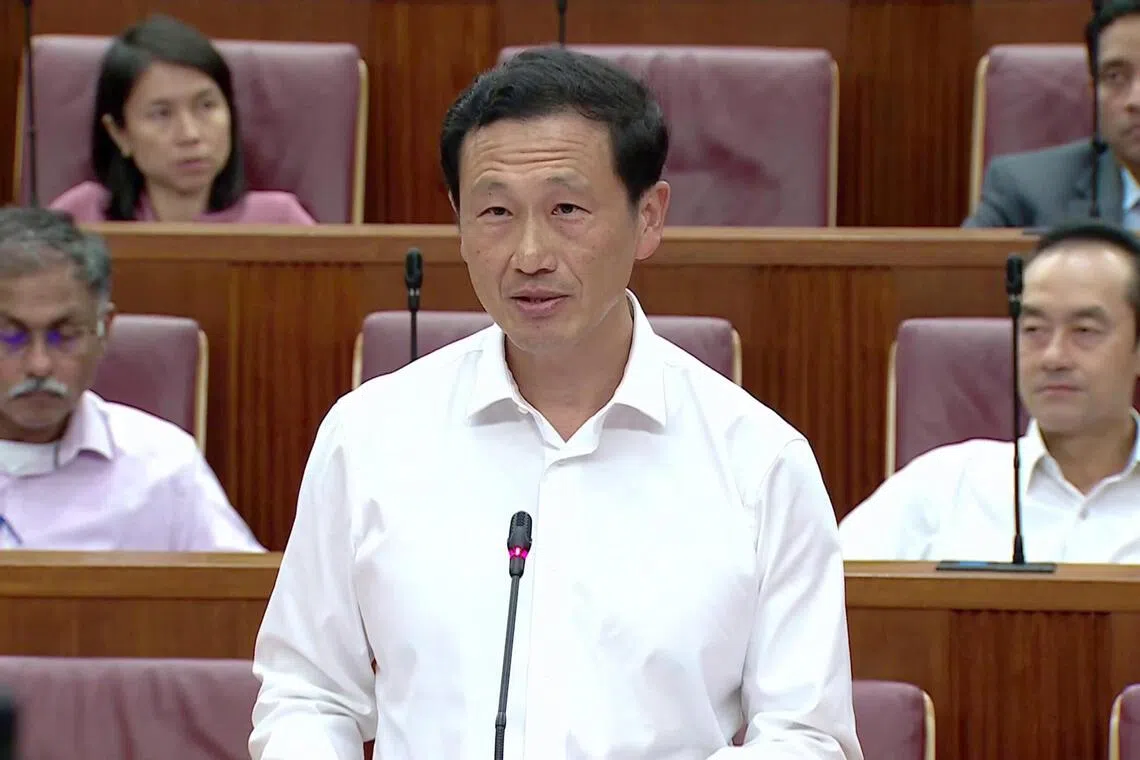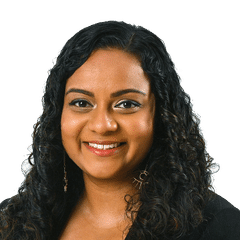S’poreans have clear expectations of PAP’s and WP’s roles; want contest of good ideas: Ong Ye Kung
Sign up now: Get ST's newsletters delivered to your inbox

Coordinating Minister for Social Policies Ong Ye Kung speaking in Parliament on Sept 23.
PHOTO: MDDI
SINGAPORE – Voters have signalled that they have clear expectations of the roles they want the ruling party and opposition to play, where a “contest of good ideas” can be used to take the country forward, said Coordinating Minister for Social Policies Ong Ye Kung.
After a hard-fought election, the PAP, with a decisive vote majority of 65.57 per cent,
At the same time, the Workers’ Party now has a sizeable presence – 12 MPs in all – to provide a check on the ruling party, Mr Ong said in his speech on day two of the debate on the President’s Address.
As the sole opposition party in Parliament, the WP must justify its standing and develop its own alternative vision, policies and pathways for Singapore, he said.
“An alternative path and vision are the essence of democratic discourse, and also what a more discerning and informed populace expects to see,” he said, noting that this shift comes as politics in Singapore matures.
For alternatives to be meaningful, they have to extend beyond “tweaking at the margins of government proposals” or simply jumping on the bandwagon when issues go viral, he added.
“If the WP wishes to position itself as the ‘0.5’ in a ‘1.5-party system’, I think it needs to present a principled, consistent and coherent approach to the main challenges facing Singapore.”
Such a system is where one major party dominates and wins elections, but a smaller, permanent opposition party also exists as a check and balance on the dominant party.
Mr Ong, who is also Health Minister, said that while the ruling PAP has its set of governing principles and policies to take Singapore forward, opposition parties can play an important role by setting out their long-term ideas, presenting clear alternative visions for governance, and outlining the pathways and policies to get there.
Singaporeans also expect political discourse to happen beyond election campaigns and be sustained throughout the parliamentary term, said Mr Ong, as he took stock of the 2025 General Election and what needs to be done next.
In a maturing democracy, voters deserve and want more than positions that merely agree with the PAP’s policies in general but suggest doing a little more, or that offer something more generous and compassionate, yet require fewer hard choices to be made, he said.
“This falls short of being a real alternative. A real alternative promises gains with the accompanying trade-offs, so that voters can make informed decisions and not be lulled into comforting illusions,” Mr Ong added.
He said the presence of a “real alternative” should form the substance of political debate, and should be a “design feature, not a bug”. The day before, Leader of the Opposition Pritam Singh said in his speech that questioning the Government in Parliament is a feature, not a bug.
Mr Ong noted that the WP had put out different proposals from time to time, such as when it called for other forms of direct taxes instead of the broad-based GST; or spending more of the income from reserves on the current generation of Singaporeans, instead of the PAP’s policy of setting aside an equal amount for current and future generations.
“Singaporeans want to see clear, well-considered visions that allow them to weigh real choices about our nation’s future,” he said.
Voters have made clear that they want the PAP as the government, and the WP as the opposition, but now each party “has the important task of fulfilling the roles the electorate expects of us”, said Mr Ong.
“That way, a vote for the PAP is not just a vote for a government that is decisive and nimble, but also an endorsement of the PAP’s principles and tried and tested methods of governance,” he said.
“A vote for the opposition is not just a vote for checks and balances, but also the policies and directions that will follow from that vote.”
Mr Ong also outlined several lessons gleaned from GE2025.
Amid an uncertain global and economic environment, Singaporeans showed that they valued a stable and effective government, and one with a proven track record of steering the country through crises – be it the Sept 11, 2001, attacks, global financial crisis or, more recently, the Covid-19 pandemic, Mr Ong said.
He said that the PAP “cannot be complacent”, and will continue to step up efforts to understand the people’s concerns and interests – be they on the domestic front or on the global stage.
“Given the global circumstances, I believe Singaporeans also want a government that not just takes care of domestic concerns, but also defends Singapore’s interests on the global stage, ensuring that Singapore stands tall among the community of nations.”
Another lesson he took away is that Singapore’s political system is still evolving, and will continue to do so.
Besides voters signalling that they are “judiciously balancing between having the PAP as government and an opposition presence as a check and balance”, he noted how calls for one-third of the seats to be held by the opposition during GE2025 did not sway voters either.
This is a composition Singaporeans are comfortable with, as shown by the way they voted during GE2025, and one that they want to make work for Singapore again, said Mr Ong.
He acknowledged that this is a “dynamic balance... it is not fixed in stone”, and dependent on several factors, such as the quality of candidates and the standards of honesty and integrity upheld by both parties; the performance of the ruling party in leading the country and its response to ground concerns; as well as the performance of the WP as a responsible opposition.
It is possible other opposition parties besides the WP will come in time, he said.
“They certainly are working hard to remain players. This is part of our political evolution.”
Additionally, Singaporeans are holding political parties to higher standards, said Mr Ong, rounding out the lessons from GE2025.
A more discerning electorate emerged, and one that demanded more substantive information and arguments during the election.
In an election that played out significantly on social media and via battlegrounds like long-form podcasts, voters showed that they are not easily persuaded by slogans or catchy phrases, and they carefully weighed in-depth opinions and substantive explanations of policy proposals, Mr Ong noted.
Populist and simplistic proposals were treated with suspicion, Mr Ong said, adding: “This willingness to take the time and trouble over political issues that we saw emerge during GE2025 may well be the defining characteristic of the Singaporean voter, but we cannot take it for granted.”
Ultimately, he called for politics in pursuit of long-term good.
“The true test of a good system of governance lies in its ability to hold a diverse society together despite disagreements, thereby strengthening unity and cohesion,” he said.
“To do this, society must get its politics right.”
Addressing Singaporeans, he asked them to continue to be discerning and demanding of information and alternative visions and pathways so that the country can decide what kind of future it wants and who to lead it there.
Turning his attention to MPs in the House, the minister called on them to not only address the grassroots-level needs of residents, but also perform their duties with integrity and honour.
As for his fellow party mates, he renewed the PAP’s commitment to being a government for all Singaporeans, including those who did not vote for the ruling party, those too young to vote, and future generations yet to be born.
“We must uphold the principles of governance that brought us here. We must recognise the trade-offs in every policy move, and carefully balance the various considerations.
“Above all, we must always think long term.”



